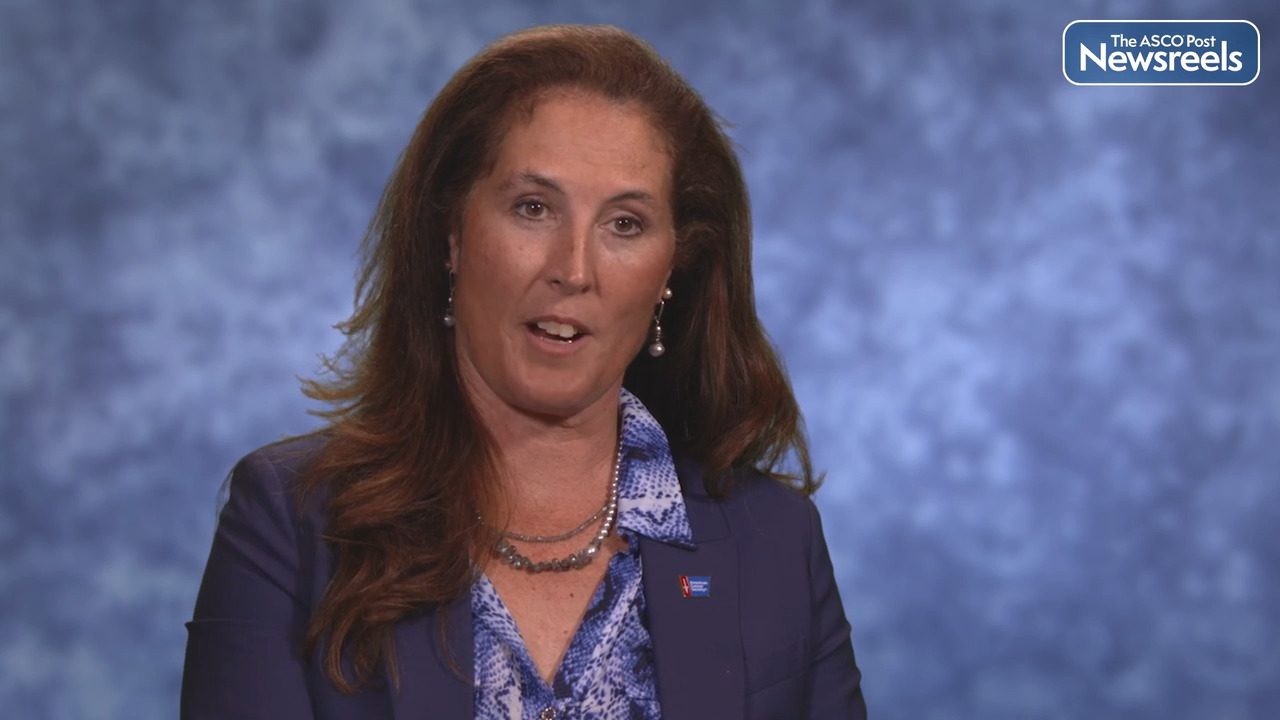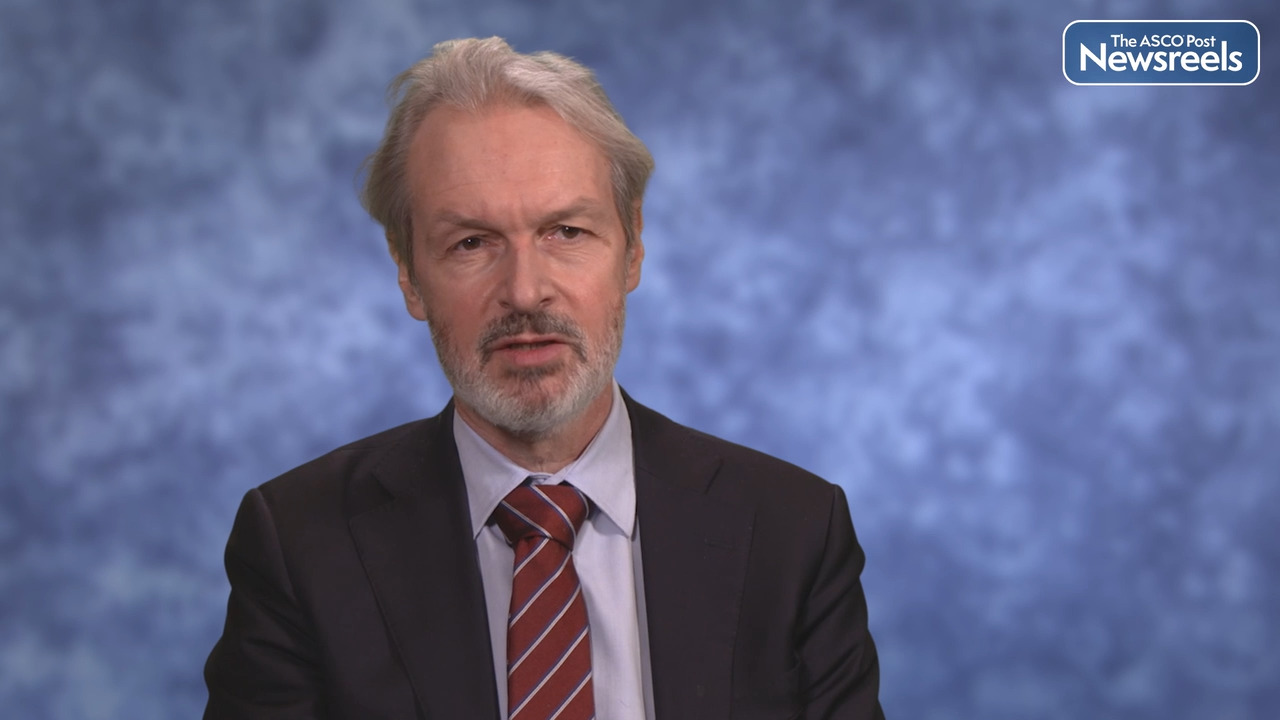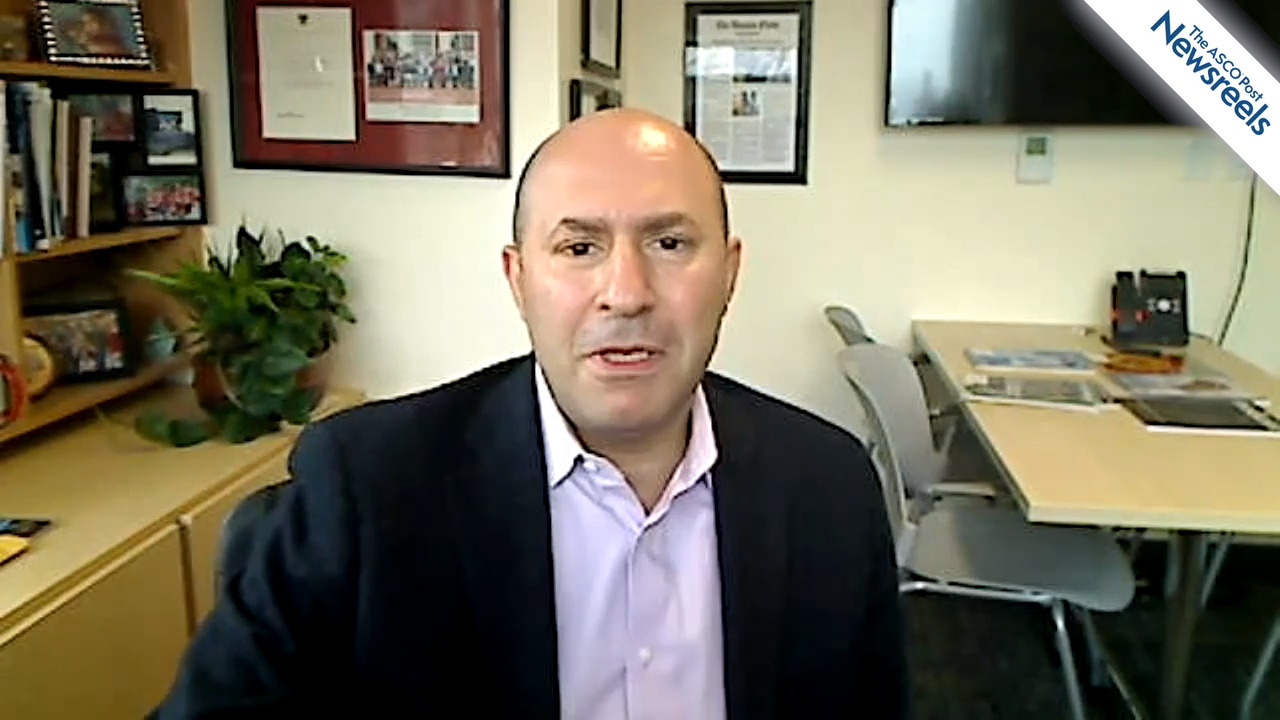Analysis of Circulating Tumor DNA as a Biomarker in Stage III or IV Wilms Tumor
In an analysis from a Children’s Oncology Group trial (AREN0533) reported in the Journal of Clinical Oncology, Madanat-Harjuoja et al found that the analysis of circulating tumor DNA (ctDNA) in children with stage III or IV Wilms tumor demonstrated high levels of agreement in identifying risk...
Nivolumab and Salvage Nivolumab/Ipilimumab for Previously Untreated Advanced Clear Cell Renal Cell Carcinoma
In a phase II trial (Hoosier Cancer Research Network GU16-260) reported in the Journal of Clinical Oncology, Michael B. Atkins, MD, and colleagues found that nivolumab monotherapy was active in previously untreated patients with advanced clear cell renal carcinoma, particularly among those with...
Lenvatinib/Pembrolizumab vs Sunitinib in Patients With Advanced Renal Cell Carcinoma: Health-Related Quality-of-Life Outcomes
In a study reported in The Lancet Oncology, Robert Motzer, MD, and colleagues found that patients with previously untreated advanced renal cell carcinoma receiving lenvatinib/pembrolizumab had similar or favorable health-related quality of life scores and prolonged time to definitive deterioration...
Biomarker-Driven Assessment of Nivolumab, Nivolumab/Ipilimumab, and VEGFR Tyrosine Kinase Inhibitors in First-Line Treatment of Metastatic Clear Cell RCC
In the French phase II BIONIKK trial reported in The Lancet Oncology, Vano et al assessed outcomes of first-line treatment with nivolumab with or without ipilimumab and VEGFR tyrosine kinase inhibitors given according to characteristics of molecular subgroups in patients with metastatic clear cell...
Deciphering Clinical Outcomes Through Molecular Profiling: The IMmotion151 Trial
Over the past decade, an improved understanding of kidney cancer biology together with the development of novel systemic therapies have substantially improved the outcomes of patients with metastatic clear cell renal cell carcinoma (RCC).1 Following extensive clinical investigations, combinations...
No Overall Survival Benefit With Atezolizumab Plus Bevacizumab vs Sunitinib in Previously Untreated Metastatic Renal Cell Carcinoma
As reported in JAMA Oncology by Robert J. Motzer, MD, of Memorial Sloan Kettering Cancer Center, and colleagues, the final overall survival analysis of the phase III IMmotion151 trial has shown no significant difference for the PD-L1 inhibitor atezolizumab plus bevacizumab vs sunitinib in patients ...
Several Studies Evaluate Agents in the First-Line, Second-Line, and Later Treatment of Advanced Kidney Cancer
The combination of nivolumab plus cabozantinib achieved a continued survival benefit compared with sunitinib in patients with untreated clear cell metastatic or advanced renal cell carcinoma, according to a final overall survival analysis of the phase III CheckMate 9ER trial.1 Additionally,...
Cabozantinib Plus Nivolumab in Advanced Non–Clear Cell Renal Cell Carcinoma
In a single-institution phase II study reported in the Journal of Clinical Oncology, Chung-Han Lee, MD, PhD, and colleagues found that the combination of cabozantinib and nivolumab was active in patients with advanced non–clear cell renal cell carcinoma (RCC) variants, particularly those with...
KEYNOTE-564 Update Supports Benefit of Adjuvant Pembrolizumab in High-Risk Renal Cell Carcinoma
An updated analysis of the phase III KEYNOTE-564 trial continues to support the use of adjuvant pembrolizumab vs placebo in patients with renal cell carcinoma at high risk of recurrence, according to a presentation at the 2022 ASCO Genitourinary Cancers Symposium.1 At 30 months of follow-up,...
CheckMate 9ER: Final Results Support First-Line Regimen of Nivolumab Plus Cabozantinib in Advanced Kidney Cancer
The combination of nivolumab plus cabozantinib achieved a continued survival benefit compared with sunitinib in patients with untreated clear cell metastatic or advanced renal cell carcinoma, according to a final overall survival analysis of the phase III CheckMate 9ER trial.1 Additionally,...
Genitourinary Oncology 2021–2022 Almanac
The past year has witnessed tremendous advances in genitourinary oncology. I am pleased to review these findings in this year’s Genitourinary Oncology Almanac from The ASCO Post. I hope that you will find this roadmap helpful in highlighting a selection of these exciting developments. Checkpoint...
KEYNOTE-564 Update Supports Benefit of Adjuvant Pembrolizumab in High-Risk Renal Cell Carcinoma
An updated analysis of the phase III KEYNOTE-564 trial continues to support the use of adjuvant pembrolizumab vs placebo in patients with renal cell carcinoma at high risk of recurrence, according to a presentation at the 2022 ASCO Genitourinary Cancers Symposium.1 At 30 months of follow-up,...
KEYNOTE-564: Adjuvant Pembrolizumab Extends Disease-Free Survival in High-Risk Renal Cell Carcinoma
Adjuvant pembrolizumab following surgery significantly improved disease-free survival compared with placebo among patients with high-risk clear cell renal cell carcinoma (RCC), according to the international phase III KEYNOTE-564 study presented at the Plenary session during the 2021 ASCO Annual...
First-Line Nivolumab Plus Cabozantinib Improves Progression-Free and Overall Survival vs Sunitinib in Advanced Renal Cell Carcinoma
As reported in The New England Journal of Medicine by Toni K. Choueiri, MD, of Lank Center for Genitourinary Oncology, Dana-Farber Cancer Institute, and colleagues, the phase III CheckMate 9ER trial has shown that the combination of nivolumab and cabozantinib improved progression-free survival and...
Sumanta K. Pal, MD, on Advances in Genitourinary Cancer Treatment: Expert Perspective
Sumanta K. Pal, MD, of City of Hope National Medical Center, discusses some key research developments in kidney cancer, including data on nivolumab and ipilimumab with or without CBM588 in metastatic renal cell carcinoma; intestinal microbiome associated with the development of grade 3 or 4 adverse events in patients with metastatic disease who have been treated with nivolumab plus ipilimumab and probiotic support; the link between TERT promoter mutations and clinical outcome with immune checkpoint inhibitor therapy for advanced urothelial cancer; mutations in the androgen receptor gene in patients with prostate cancer receiving novel androgen deprivation treatments; and findings on waning antibody titers in patients who have received COVID-19 vaccinations (Roundup of Abstracts 371, 561, 374, Posters 38 and 48).
KEYNOTE-564 Update Supports Benefit of Adjuvant Pembrolizumab in High-Risk Renal Cell Carcinoma
An updated analysis of the phase III KEYNOTE-564 trial continues to support the use of adjuvant pembrolizumab vs placebo in patients with renal cell carcinoma at high risk of recurrence, according to a presentation at the 2022 ASCO Genitourinary Cancers Symposium.1 At 30 months of follow-up,...
Toni K. Choueiri, MD, on Renal Cell Carcinoma: Follow-up Data on Pembrolizumab
Toni K. Choueiri, MD, of Dana-Farber Cancer Institute, discusses a 30-month follow-up of results from the KEYNOTE-564 trial, which further support the use of adjuvant pembrolizumab when treating patients with renal cell carcinoma at intermediate-high or high risk of recurrence, or with an M1 NED (no evidence of disease) status after nephrectomy. The data show a disease-free survival benefit vs placebo (Abstract 290).
Risk of Major Adverse Cardiovascular Events With Combined Immune Checkpoint Inhibition and VEGFR Inhibition in Patients With Advanced RCC
As reported in the Journal of Clinical Oncology by Brian I. Rini, MD, and colleagues, prospective cardiovascular monitoring in the phase III JAVELIN Renal 101 trial in advanced renal cell carcinoma (RCC) showed that patients with higher baseline troponin T levels receiving the combination of the...
(Epi)genetic Predisposing Factors in Wilms Tumor
In a Dutch study reported in the Journal of Clinical Oncology, Janna A. Hol, MD, and colleagues found that (epi)genetic predisposing factors could be identified in one-third of children diagnosed with Wilms tumor. As stated by the investigators, “Wilms tumor is associated with (epi)genetic...
Karen E. Knudsen, PhD, MBA, on Addressing Disparities in Genitourinary Cancers
Karen E. Knudsen, PhD, MBA, Chief Executive Officer of the American Cancer Society, discusses ways to address the inequities in genitourinary screening, treatment, and outcomes. Her suggestions focus on increasing awareness of screening, identifying risk factors, the dramatic rise in incidence among Hispanic individuals, and the basis for increased mortality in Black men.
Minority Enrollment in U.S. Phase II and III Trials in Genitourinary Cancers
In a study reported in the Journal of Clinical Oncology, Owens-Walton et al found that minority populations are underrepresented in phase II and III trials targeting prostate, kidney, and bladder cancers taking place in the United States. Study Details In the analysis, the ClinicalTrials.gov...
Axel Bex, MD, PhD, on Renal Cell Carcinoma: New Findings From the NeoAvAx Trial on Avelumab and Axitinib
Axel Bex, MD, PhD, of The Netherlands Cancer Institute, discusses an efficacy, safety, and biomarker analysis of neoadjuvant avelumab and axitinib in patients with localized renal cell carcinoma who are at high risk of relapse after nephrectomy (Abstract 289).
Matthew R. Zibelman, MD, on Renal Cell Carcinoma: New Results on Combination of Nivolumab and Axitinib
Matthew R. Zibelman, MD, of Fox Chase Cancer Center, discusses phase I/II results from a study of treatment-naive patients with advanced renal cell carcinoma who received a combination of the immunotherapy (IO) nivolumab and the tyrosine kinase inhibitor (TKI) axitinib. The findings suggest that the efficacy of this regimen is comparable to that of currently available IO/TKI combinations for this population and has a similar safety profile (Abstract 291).
First-Line Nivolumab/Cabozantinib vs Sunitinib for Advanced Renal Cell Carcinoma: Patient-Reported Outcomes
In an analysis from the phase III CheckMate 9ER trial reported in The Lancet Oncology, David Cella, PhD, FASCO, and colleagues found that nivolumab/cabozantinib was associated with maintained or improved patient-reported outcomes vs sunitinib in the first-line treatment of advanced renal cell...
Atezolizumab/Bevacizumab vs Sunitinib in Previously Untreated Patients With Metastatic RCC: Final Overall Survival Analysis of IMmotion151
As reported in JAMA Oncology by Robert J. Motzer, MD, and colleagues, the final overall survival analysis of the phase III IMmotion151 trial has shown no significant difference for atezolizumab plus bevacizumab vs sunitinib in previously untreated patients with metastatic renal cell carcinoma...
Stereotactic Radiation May Prolong Duration of Systemic Therapy for Metastatic Kidney Cancer
A new study published by Hannan et al in European Urology Oncology showed that highly focused radiation to isolated metastases that progress despite drug therapy may prolong drug efficacy in patients with kidney cancer. Together with a Canadian report recently published by Cheung et al in European...
Pembrolizumab for Adjuvant Treatment of Renal Cell Carcinoma
On November 17, 2021, the immunotherapeutic agent pembrolizumab was granted approval for adjuvant treatment of patients with renal cell carcinoma at intermediate-high or high risk of recurrence following nephrectomy or nephrectomy and resection of metastatic lesions.1 Supporting Efficacy Data...
Belzutifan Shows Activity in Patients With von Hippel-Lindau Disease–Associated Renal Cell Carcinoma
In the phase II MK-6482-004 trial reported in The New England Journal of Medicine, Eric Jonasch, MD, and colleagues found that the hypoxia-inducible factor (HIF)-2α inhibitor belzutifan produced responses in patients with renal cell carcinoma (RCC) associated with von Hippel-Lindau disease....
Adjuvant Immunotherapy: The Next Chapter in Advancements in Renal Cell Carcinoma
Renal cell carcinoma is a common malignancy among men and women in the United States.1 The incidence continues to increase with the ever-increasing use of contemporary medical imaging. Although many patients who present with localized disease are cured with definitive surgery, some patients develop ...
KEYNOTE-564 Trial: Adjuvant Pembrolizumab Improves Disease-Free Survival in High-Risk Renal Cell Carcinoma
As reported in The New England Journal of Medicine by Toni K. Choueiri, MD, of Dana-Farber Cancer Institute, and colleagues, an interim analysis of the phase III KEYNOTE-564 trial has showed improved disease-free survival with adjuvant pembrolizumab vs placebo after nephrectomy in high-risk...
FDA Approves Pembrolizumab for Adjuvant Treatment of Renal Cell Carcinoma
On November 17, the U.S. Food and Drug Administration (FDA) approved pembrolizumab (Keytruda) for the adjuvant treatment of patients with renal cell carcinoma (RCC) at intermediate-high or high risk of disease recurrence following nephrectomy or nephrectomy and resection of metastatic lesions....
Definitive Radiotherapy Without Systemic Therapy for Oligometastatic Renal Cell Carcinoma
In a single-center phase II study reported in The Lancet Oncology, Tang et al found that definitive radiotherapy in place of systemic therapy was feasible and effective for the treatment of oligometastatic renal cell carcinoma. As stated by the investigators, “The role of radiotherapy in metastatic ...
Is Cabozantinib Active in Treating Brain Metastases From Renal Cell Carcinoma?
In a retrospective cohort study reported in JAMA Oncology, Hirsch et al found that cabozantinib showed substantial activity in treating brain metastases in patients with renal cell carcinoma. As stated by the investigators, “Patients with brain metastases from renal cell carcinoma have been...
Rates of Postprotocol Immunotherapy Use in Patients Enrolled in Kidney Cancer Clinical Trials
In an analysis reported in JAMA Network Open, Sharp et al identified the frequency of use of postprotocol PD-1/PD-L1 inhibitors in control group patients receiving the tyrosine kinase inhibitor sunitinib in randomized trials comparing PD-1/PD-L1 inhibitor–containing combination therapy vs sunitinib ...
Lenvatinib Plus Pembrolizumab for First-Line Treatment of Advanced Renal Cell Carcinoma
On August 10, 2021, the combination of lenvatinib plus pembrolizumab was approved for first-line treatment of adults with advanced renal cell carcinoma.1,2 Supporting Efficacy Data Approval was based on findings from the three-arm, open-label, phase III CLEAR trial (Study 307/KEYNOTE-581;...
Naveen S. Vasudev, PhD, MBChB, on RCC: Changing the Dosing Schedule of Ipilimumab Plus Nivolumab
Naveen S. Vasudev, PhD, MBChB, of the University of Leeds, discusses phase II results from the PRISM trial, which showed that giving ipilimumab every 12 weeks instead of every 3 weeks, in combination with nivolumab, led to lower rates of grade 3 and 4 toxicities in patients with advanced renal cell carcinoma. Efficacy appeared to be comparable between both arms (Abstract LBA29).
COSMIC-021: Cabozantinib Plus Atezolizumab for Advanced Renal Cell Carcinoma
In the phase Ib COSMIC-021 trial reported in the Journal of Clinical Oncology, Sumanta K. Pal, MD, FASCO, and colleagues found that the combination of cabozantinib and atezolizumab produced durable responses in patients with advanced renal cell carcinoma (RCC). Study Details One hundred and two...
Toni K. Choueiri, MD, on Renal Cell Carcinoma: Quality-of-Life Data From KEYNOTE-564 on Pembrolizumab vs Placebo
Toni K. Choueiri, MD, of Dana-Farber Cancer Institute, discusses patient-reported outcomes for quality of life in the KEYNOTE-564 study, which previously met its primary endpoint of disease-free survival with adjuvant pembrolizumab vs placebo following surgery for renal cell carcinoma (Abstract 653O).
KEYNOTE-564: Adjuvant Pembrolizumab Extends Disease-Free Survival in High-Risk Renal Cell Carcinoma
Adjuvant pembrolizumab following surgery significantly improved disease-free survival compared with placebo among patients with high-risk clear cell renal cell carcinoma (RCC), according to the international phase III KEYNOTE-564 study presented at the Plenary session during the 2021 ASCO Annual...
Adjuvant Pembrolizumab May Improve Disease-Free Survival in Patients With High-Risk Renal Cell Carcinoma
As reported in The New England Journal of Medicine by Toni K. Choueiri, MD, and colleagues, an interim analysis of the phase III KEYNOTE-564 trial showed improved disease-free survival with adjuvant pembrolizumab vs placebo after nephrectomy in high-risk patients with clear cell renal cell...
FDA Approves Belzutifan for Cancers Associated With von Hippel-Lindau Disease
On August 13, the U.S. Food and Drug Administration (FDA) approved belzutifan (Welireg), a hypoxia-inducible factor inhibitor, for adult patients with von Hippel-Lindau (VHL) disease who require therapy for associated renal cell carcinoma (RCC), central nervous system (CNS) hemangioblastomas, or...
FDA Pipeline: Reviews for Agents in Lung Cancer, Thyroid Cancer, Kidney Cancer, and More
Recently, the U.S. Food and Drug Administration (FDA) accepted applications for agents aiming to treat non–small cell lung cancer (NSCLC), differentiated thyroid cancer, renal cell carcinoma (RCC), hypersensitive acute lymphoblastic leukemia (ALL), mucosal melanoma, and endometrial carcinoma....
FDA Approves Lenvatinib/Pembrolizumab for Advanced Renal Cell Carcinoma
On August 10, the U.S. Food and Drug Administration (FDA) approved the combination of lenvatinib (Lenvima) plus pembrolizumab (Keytruda) for the first-line treatment of adult patients with advanced renal cell carcinoma (RCC). CLEAR Trial The efficacy of this combination was investigated in CLEAR...
Tivozanib for Relapsed or Refractory Advanced Renal Cell Carcinoma
On March 10, 2021, the VEGF tyrosine kinase inhibitor tivozanib was approved for treatment of adults with relapsed or refractory advanced renal cell carcinoma following at least two prior systemic therapies.1,2 Supporting Efficacy Data Approval was based on findings in the open-label, phase III...
Oral Anticancer Agent Use in Patients With Metastatic Renal Cell Carcinoma
In a population-based cohort study reported in JCO Oncology Practice, Stephanie B. Wheeler, PhD, and colleagues found a low rate of oral anticancer agent use within 12 months after detection of metastatic disease in patients with renal cell carcinoma. Study Details The study used a novel, North...
KEYNOTE-564: Adjuvant Pembrolizumab Extends Disease-Free Survival in High-Risk Renal Cell Carcinoma
Adjuvant pembrolizumab following surgery significantly improved disease-free survival compared with placebo among patients with high-risk clear cell renal cell carcinoma (RCC), according to the international phase III KEYNOTE-564 study presented at the Plenary session during the 2021 ASCO Annual...
Is Lenvatinib Plus Pembrolizumab an Effective Treatment for Patients With Metastatic Renal Cell Carcinoma?
As reported in The Lancet Oncology by Chung-Han Lee, MD, and colleagues, findings in a cohort of the phase Ib/II Study 111/KEYNOTE-146 trial showed that the combination of lenvatinib and pembrolizumab produced high response rates among patients with metastatic clear cell renal cell carcinoma...
Study Explores Incidence Rates for Various Pediatric Cancers Across Age and Racial Groups
New research has uncovered substantial differences in the rates of childhood cancers when considering a single year of age rather than grouping several years together. The study, published by Marcotte et al in the journal Cancer, also found that minority children seem to have different risks than...
Cabozantinib With Nivolumab for Metastatic Renal Cell Carcinoma: A New Front-Line Standard
The pace of clinical research in metastatic renal cell carcinoma is faster than ever. Over the past 5 years, we have seen data from six phase III clinical trials evaluating combination strategies with checkpoint inhibitors. The era began with data from CheckMate 214, evaluating nivolumab with...
Robert J. Motzer, MD, on RCC: Quality of Life for Patients Treated With Lenvatinib-Based Therapy vs Sunitinib
Robert J. Motzer, MD, of Memorial Sloan Kettering Cancer Center, discusses health-related quality-of-life data from the phase III CLEAR trial, which compared lenvatinib plus pembrolizumab or everolimus vs sunitinib as first-line treatment for patients with advanced renal cell carcinoma (Abstract 4502).








